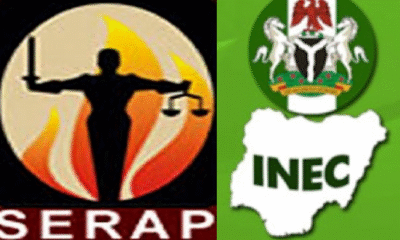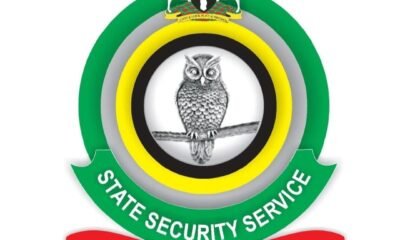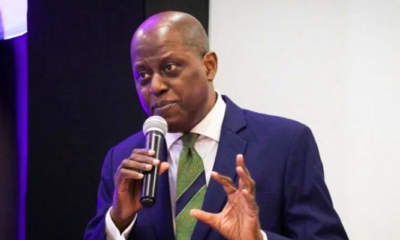News
Police, power sector most corrupt – SERAP Survey

The police in Nigeria have emerged as the most corrupt public institution in the country, according to a new survey released today by Socio-Economic Rights and Accountability Project (SERAP).
The power sector was ranked second in the survey’s corruption index, which examined five public institutions in Nigeria in the last 5 years.
Other public institutions identified as corrupt by 70% of Nigerians surveyed are: the judiciary, education and health ministries. The survey reveals that the level of corruption has not changed in the last 5 years.
Read also: Sugary drinks can cause heart diseases, study reveals
The report entitled Nigeria: Corruption Perception Survey was launched today at the Sheraton Hotels, Lagos.
According to the survey, “a bribe is paid in 54% of interactions with the police. In fact, there is a 63% probability that an average Nigerian would be asked to pay a bribe each time he or she interacted with the police. That is almost two out of three.”
Professor Akin Oyebode who chaired the launching of the report said: “Nigeria is looked upon as a giant of Africa. Yet Nigeria could not conduct free, fair and credible elections. It is a smear on the image of Nigeria. If we do away with selective enforcement and condonation of corruption, we will build and live in a better society. Corruption is a refined form of stealing. The politicians are stealing our common patrimony. Development of the people is almost inversely proportional to the level of corruption.”
The survey identified Corruption as a significant impediment to law enforcement, access to justice and basic public services such as affordable healthcare, education, and electricity supply.
“Several Nigerians have to pay a bribe to access police, judiciary, power, education and health services. Corruption is still a key concern in the country with 70% of Nigerians describing the level of corruption as high and in the same measure, stating that corruption levels either increased or remained the same in the last five years.”
“The national survey carried out between September and December 2018, covered the police, judiciary, power, education and health sectors to assess the state of corruption in law enforcement and public service provision.”
“From the analysis of the anti-corruption legal and institutional framework in Nigeria, the following cross-cutting issues emerged: there is lack of political will to consistently enforce the different anti-corruption laws; inadequate funding for the various anti-corruption agencies; weak public support and/or ownership of anti-corruption initiatives; poor clarity of roles between various anti-corruption agencies; and public perceptions of politicisation of corruption arrests and prosecutions.”
“Bribery experiences were interrogated and recorded in the key sectors of education, health, the police, judiciary and power. Data analysis was conducted under five different and interrelated variables. There was a 63% probability that an average Nigerian would be asked to pay a bribe each time he/she interacted with the police. The likelihood of bribery in the power sector stood at 49%. With the chances of encountering bribery at the judiciary, education and health services standing at 27%, 25% and 20% respectively.”
“The police were the most adversely ranked on this indicator. For every 100 police interactions reported by the respondents, there was a bribe paid in 54 interactions. The prevalence levels stood at 37% in the power sector and 18% in education,17.7% in the judiciary and 14% in the health sector.”
“51% of the individuals that paid bribes to the police and 35% to the power sector believed this was the only way to access the services sought from the institutions. The ranking of the education sector and the judiciary was less adverse with 16% perceiving bribery as the main avenue of accessing services in the institutions, and health services recording 13%.”
“The police and judiciary had the largest proportion of total bribes paid at 33% and 31% respectively. Bribes paid for education, power and health services accounted for 19%, 10.9 and 5% respectively of all bribes reported. The average amount of bribe paid by the respondents was highest among those who paid to the judiciary at about Naira 108,000 (US$ 298). All the other institutions ranked lower on this variable with Naira 12,253 and 11,566 reportedly paid to the police and education sectors, and Naira 6,462 and 5,143 paid for health and power services respectively.”
“Perceptions on corruption trends in Nigeria show almost 70% of the respondents perceived the current level of corruption as high compared to 15.5% that felt it was low. 70% of the respondents said corruption levels either increased or remained the same in the last five years. Only a quarter of the respondents felt corruption reduced in this period.”
“About 41% of the respondents projected that corruption will either increase or remain the same in the next year. About a third of the respondents (31.5%) believed the ruling elite are pursuing their selfish interests only therefore corruption levels will increase into the future. Additionally, about a quarter of the respondents (24.9%) believed the current anti-corruption efforts are not comprehensive enough. The poor state of the economy was also seen as a driving factor to increased corruption at 17.2%.”



























